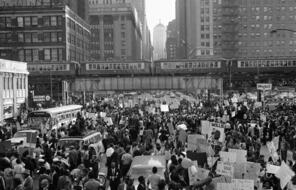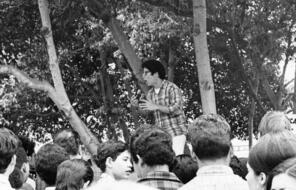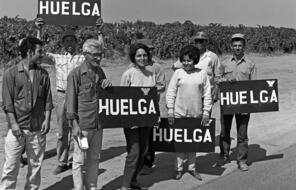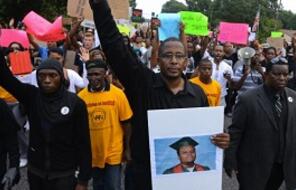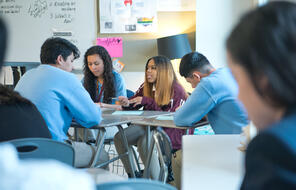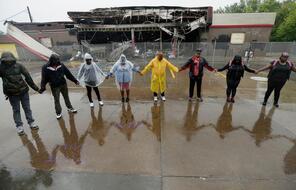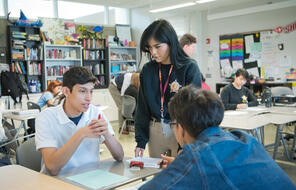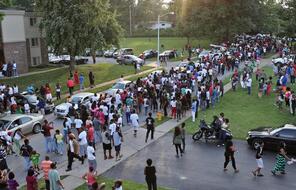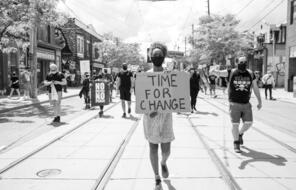Growing Up with Racism
At a Glance
Subject
- History
- Social Studies
- Racism
Lisa Delpit is an educator who grew up in Baton Rouge, Louisiana, at a time when police officers patrolled the street that separated the city’s black and white residents. Although that time in history has passed, her experiences continue to shape Delpit’s views, including her hopes and fears for her child. In a letter to her daughter, Maya, Delpit writes:
As much as I think of you as my gift to the world, I am constantly made aware that there are those who see you otherwise.
Although you don’t realize it yet, it is solely because of your color that the police officers in our predominantly white neighborhood stop you to “talk” when you walk our dog. You think they’re being friendly, but when you tell me that one of their first questions is always, “Do you live around here?” I know that they question your right to be here, that somehow your being here threatens their sense of security....
I did not have to be told much when I was your age. When I was growing up in Louisiana in the 1950s and 1960s, the color lines were very clearly drawn. I followed my mother to the back entrance of the doctor’s office, marked “colored.” I knew which water fountain I was supposed to drink from. On the bus ride to my all-black school, I watched white children walk to schools just two or three blocks from my house.
In large part, my childhood years were wrapped in the warm cocoon of family and community who all knew each other and looked out for one another. However, I remember clearly my racing heart, my sweaty-palmed fear of the white policemen who entered my father’s small restaurant one night and hit him with nightsticks, the helpless terror when there were rumors in our school yard that the Ku Klux Klan would be riding, the anxiety of knowing my college-aged foster sister had joined the civil-rights marchers in a face-off against the white policemen and their dogs. And, I remember, my Maya, the death of your grandfather when I was seven, who died of kidney failure because the “colored” ward wasn’t yet allowed the use of the brand-new dialysis machine.
Your world is very different, at least on its surface. In many ways now is a more confusing time to live....
As any mother would, I have a great need to protect you, but it is hard to know how. My childhood experience was different from yours. As was the case in many African-American Louisiana families, our family was a rainbow of colors from chocolate-brown brunettes to peach-colored blondes...I was the light-skinned, freckled, red-headed child, who always got the sunburn whenever we went to the beach. Because of my coloring, I had another role, too. When traveling by car, African Americans were not allowed to use the restrooms or other facilities white travelers took for granted. Black families had to develop all sorts of strategies to make a road trip workable. When it was time for a rest stop, one of our ruses was to pull around to the side of the service station and send in the one who looked most like white to get the key. Then, outside of the attendant’s view, everyone would use the facility.
Decades later, when you were an infant, your aunt and I drove to Mississippi. I had not made that trip for many years, and although segregation was officially over, I still felt uneasy at the rest stops. Any African American would. There were Confederate flags printed on every possible souvenir in the gift shops, and restaurants and gas stations were filled with burly, white, cigarette-smoking men with gun racks mounted in their rear windows. Heart racing, cradling my beautiful brown baby, I suddenly realized I did not know how to protect you from the vicious hatred in some of the eyes that stared at us. Or, for that matter, from a society whose very structure privileges some and marginalizes you.
...When I was in my segregated, all-black elementary school, we were told by teachers and parents that we had to excel, that we had to “do better than” any white kids because the world was already on their side. When your cousin Joey was in high school, I remember berating him for getting a “D” in chemistry. His response was, “What do you expect of me? The white kids get C’s.” Recently a colleague tried to help an African-American middle-schooler to learn multiplication. The student looked up at the teacher and said, “Why are you trying to teach me this? Black people don’t multiply. Multiplication is for white people.” You know, Maya, I think that may be the biggest challenge you and other brown children will face—not believing the limits that others place upon you. 1
- 1Lisa Delpit, “Explaining Racism,” The Magazine of the Harvard Graduate School of Education (Spring 2000), 15–17.
Get the Reading
How to Cite This Reading
Facing History & Ourselves, "Growing Up with Racism," last updated March 12, 2018.
This reading contains text not authored by Facing History & Ourselves. See footnotes for source information.

